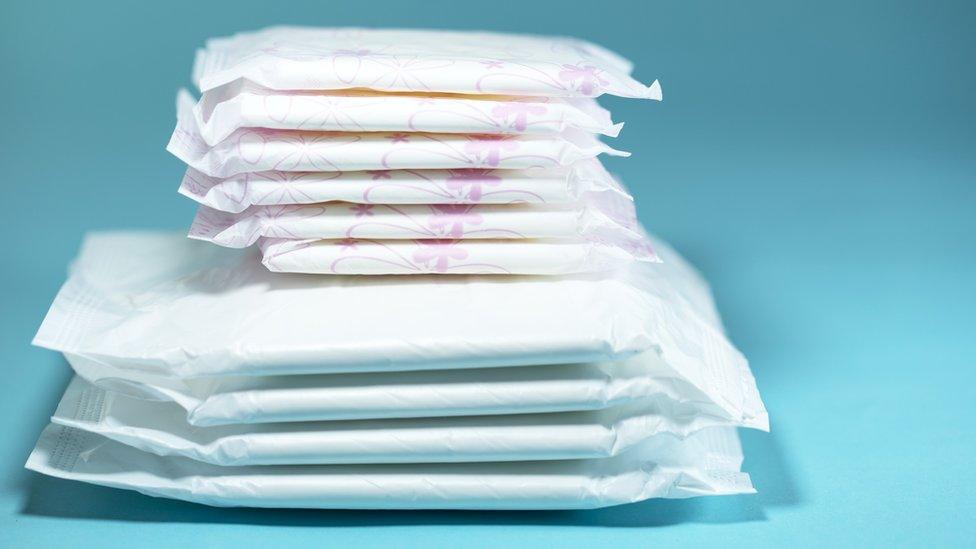Period poverty: Scotland is the first country to provide free sanitary products
- Published
- comments

Scotland has become the first country in the world to make period products free for all.
It comes after Members of the Scottish Parliament (MSPs) voted for new legislation on Tuesday evening.
MSPs voted on a bill called the Period Products (Free Provision) (Scotland) Bill, which will make tampons and sanitary pads accessible in public buildings for free.
The new law has made it a legal duty for Scottish councils to ensure that free period products are available to "anyone who needs them".
What are sanitary products?
Some people struggle to afford period products
They are products like tampons, pads and reusable items, which are worn when a person is on their period.
You'll see them in any supermarket, but they can cost a lot of money.
Periods are a normal part of growing up, and for girls they usually start during puberty.
What is period poverty?
Some people are unable to access sanitary products because they can't afford them.
According to the PHS group, a company which provides hygiene services in the UK, almost half of British teenagers feel period poverty holds pupils back from going to school or college, and around a third (32%) say they've either been directly affected by period poverty, or they know someone else who has.
About 10% of girls in the UK have been unable to afford period products; 15% have struggled to afford them; and 19% have changed to a less suitable product due to cost, according to research by children's charity Plan International UK.
It's estimated that the average woman spends ÂŁ4,800 on period products during her lifetime.
What else does the bill include?
In 2018, Scotland became the first country in the world to make period products available for free in schools, colleges and universities. This new bill will protect this provision in law.
As well as period poverty, the bill also wants to tackle period stigma. Researchers say this is particularly an issue for young girls. They found that almost three quarters (71%) of 14-21 year olds felt embarrassed buying period products.
The impact on education is another area the bill wants to tackle - with researchers finding almost half of girls surveyed have missed school because of their period.
This law will ensure no-one has to go without essential period products.
Scottish Labour MSP Monica Lennon has campaigned for the "world-leading" legislation to introduce free universal access to sanitary products.
Speaking ahead of Tuesday's vote, Ms Lennon said: "Thanks to a bold grass roots campaign and cross-party support, Scotland has already taken great strides to improve access to period products."
She went on to say that this was "a world-leading opportunity to secure period dignity for all women, girls and people who menstruate.
"The campaign has been backed by a wide coalition, including trades unions, women's organisations and charities.
"Thousands of supporters have played a part, including people who shared their experiences of period poverty, and I am grateful to them all."
What's happening in other parts of the UK?
The Welsh government announced that primary and secondary pupils in the country would be given access to free sanitary products in April last year.
It's committed to providing a further ÂŁ3.1 million to help tackle period poverty in 2020. An additional ÂŁ220,000 will be available to councils to provide products in libraries and community hubs for women who can't afford them.
There is no Northern Ireland-wide scheme to provide girls with free sanitary products. However, in 2018, Derry City and Strabane District Council became the first local authority in Northern Ireland to make sanitary products available in some of its public buildings.
- Published25 February 2020
- Published1 July 2020
- Published20 January 2020
